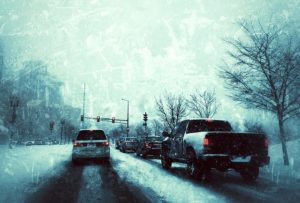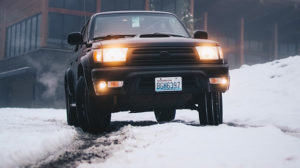As I write this article, we are set to receive another snowstorm. We still have snow on the ground from the last storm. Now here in the Ozarks, we don’t see much snow so following the tips for traveling in winter weather below will be extra important.
Many of you live in areas that are snow-covered for months and the tips below are just a way of life.
Having said that, it is important for those that do not drive in inclement weather often to go over the steps listed below. You don’t want to make a simple trip to the market a disaster by getting stranded or worse.
Now I know this isn’t a TEOTWAWKI type of situation in most cases, but it could be. Sometimes it’s the small preps that make the biggest difference.
Real Life Inclement Weather Travel Situation

In 2017 we had an ice storm that caught many drivers off guard. Included in that traffic jam was a close family member and they had quite a story to tell. But I won’t go into detail here but here is the short version. They were stranded in traffic for over eight hours and found that they were extremely unprepared. Many drivers abandoned their vehicles and chose to walk. They had their work clothes (suits and ties) and no other form of footwear. They were severely underclothed and had nothing to eat or drink.
According to the highway patrol, after the event, there was no accident, no emergency, it was caused by drivers not being able to climb a hill in the ice. The jam went on for miles and triggered many to start preparing their vehicles to avoid that situation in the future.
No one expected to be stranded that day, but I bet they prepare for that situation now.
Do I Need a Professional to Prep My Car for Traveling in Winter?
The quick answer is no. For the purpose of this article, I am not going to advise any mechanical work outside of the possibility that you may need to change your windshield wipers. The time to perform these checks is during the calm before the storm.
Let’s get to the check list for vehicle safety while traveling in winter.
Inspect Windshield Wipers and Top Off Washer Fluid

Damaged windshield wipers will reduce visibility by not removing snow and road debris adequately. Check for rips, nicks, and missing parts on your wiper assembly and replace if necessary. I recommend you do not go cheap on this, buy a quality wiper and you will be amazed at the difference in performance compared to the thinner economy versions.
While you are checking your wipers, it’s a good time to top off your wiper fluid. You should always keep an extra gallon of the non-freeze wiper fluid around for just this reason. This can be a blessing when the dirt and debris from the road are kicked up on your windshield by other cars.
The treatment the Department of Transportation applies to the road can get quite gunky and a non-freeze windshield washer can help your wipers get the job done. You will go through a lot of this even on a short drive.
Get Some Good Non-Slip Floor Mats
Floor mats can get quite gunked up and slippery in snowy weather. I suggest getting good quality floor mats that can hold water. Further, look for floor mats that are slip-resistant, stain-resistant and easily removed for cleaning.
You will want to make sure the mats are installed properly and are not interfering with your pedals (accelerator, brake, clutch, etc..).
Check Tire Pressure and Tire Tread When Traveling in Winter
Proper tire pressure can maximize your vehicle’s stability and contact with the road. It also helps your fuel efficiency so it should be checked year-round. Be sure to check each tire with a quality tire pressure gauge and make sure the pressure is within the manufacturer’s recommendations. Remember, the temperature will affect tire pressure so the lower the temp the lower the tire pressure will read.
Slicks and traveling in winter do not go well together so while you are checking tire pressure, take the time to check your remaining tread as well. You can use the penny method by placing a penny in the tread valley and Lincoln’s head should not be visible. If you can see all of Lincoln’s head, your tires need to be replaced.
Low tire tread will also increase the chance of hydroplaning in rainy weather.
Test to Ensure Lights and Signals are Working Properly

Grab a friend and check those lights. Have them stand behind and in front of your vehicle and test:
- Running lights
- Brake lights
- Turn signals
- Reverse lights
- Headlights
- Fog lights (if applicable)
- Trouble lights
Check Your Vehicle Battery
A fully charged automotive battery should be around 12.6 volts or above. When the engine is running, the battery should measure around 13.7 to 14.7 volts.
Replace your battery if:
- If your vehicle is slow to turn over
- Lights are dim
- Lights brighten when engine is revved
Get yourself a good voltage meter and check your battery often. If you don’t want to purchase a voltage meter, many auto parts stores will check your battery for free. They can also do a load check to see if your battery is nearing the end of life.
Stock Your Vehicle with Essential Emergency Supplies
I am sure most of our readers probably pack a bug out bag or a get home bag in their vehicle. But for some, this will be a great list to get you started and for others it could be a refresher.
Survival Supplies to Keep Your Vehicle Running
| Jumper Cables
Extra washer fluid Anti-Freeze A copy of your owner’s manual Tire sealant such as Fix-a-flat A wheel wrench and car jack |
Roadside flares
Extra quart of oil Fire extinguisher Ice scraper and snow brush Cat litter for traction Reflective triangles |
Survival Supplies to Maintain Your Safety
| Extra warm clothing
WindbreakerWarm hat or hood Energy bars, Snacks, water P-38 can opener Stainless steel water bottle to melt snow and warm water Toilet paper Hand sanitizer First aid kit Bug repellent Sunscreen Space blanket or sleeping bag Dry clothing, socks, boots, gloves Hand and/or body warmers |
Flashlight with fresh batteries or wind up
Snow boots Headlamp Firestarter Knife Rope or tow strap winch Gloves FRS radios or HAM radios, Well-charged cell phone or CB radio Duct Tape Cash Photo ID Playing cards and games if you have kids (or for yourself) Wool blanket |
Check out our Ultimate Prepper and Survival Supply Checklist.
In addition to the lists above, here’s a few more things to check but if you find something wrong, it may require professional help.
- Check your heat and defrost
- Check for fluid leaks
Finally

Never let your fuel tank drop below half full while traveling in winter. I know that can be a pain to stop more often but you will be glad you did if you get stranded or stuck in traffic. And, in some emergency situations, gas may not be available, or lines may be extremely long.
There is nothing more calming than knowing you are prepared if you are stranded or that you have the ability to help others in trouble. I hope this list helps you assemble the perfect vehicle emergency kit for your area. Don’t put it off, get it together today.
EVERLIT 250 Pieces Survival First Aid Kit IFAK EMT Molle Pouch Survival Kit Outdoor Gear Emergency Kits Trauma Bag for Camping Boat Hunting Hiking Home Car Earthquake and Adventures
20% OffBushcraft First Aid: A Field Guide to Wilderness Emergency Care (Bushcraft Survival Skills Series)
22% OffAuto Amazon Links: No products found. No products found.
Auto Amazon Links: No products found. No products found.







